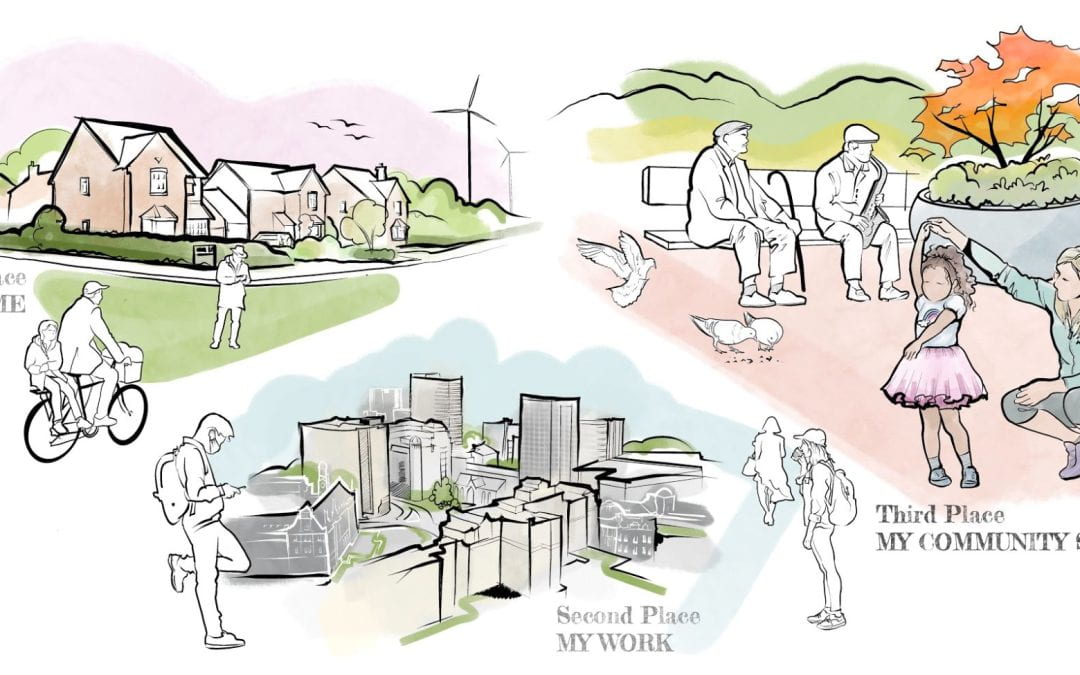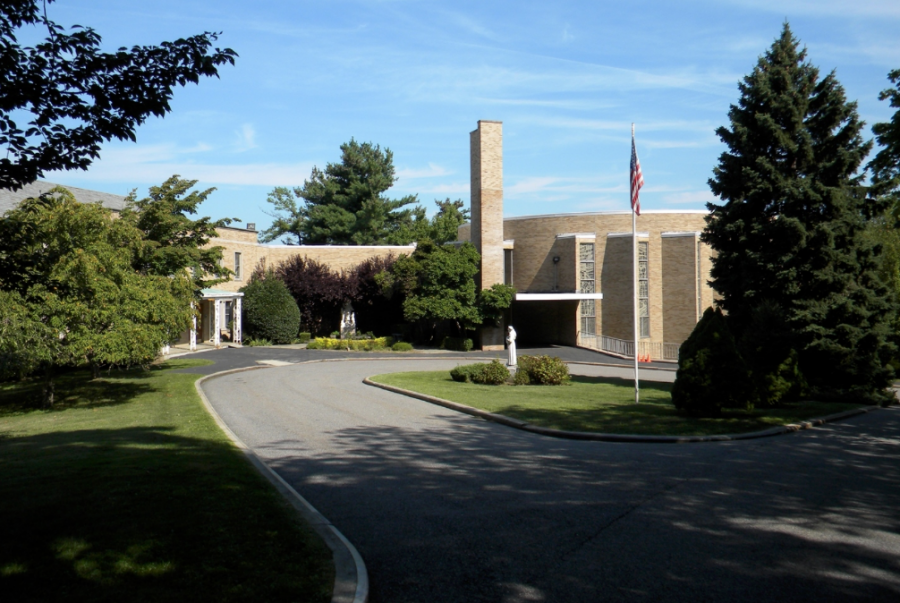Cultural Comparisons: A Dialogue with Students from Yeshiva Mesivta Menachem
November 18, 2020
The United States is not a campground. At a campground, so long as you follow the rules, clean up your trash, and leave everyone else alone, you can go about your business as you please. The land at a campground allows people to settle and live without ever mingling meaningfully.
In our country, Americans teach each other’s children at public schools, feed each other at food banks, encourage each other to vote, and die for each other in dangerous foreign lands. America is a community, not a campground.
It is thus impossible to claim that the United States does not have a culture. The people of the United States, however divided, tend to take for granted certain ideals which bind them together. Americans believe in liberalism: the philosophy that promotes individual rights, free trade and enterprise, civil liberties, and democracy. Roughly half of Americans are Protestants, and another quarter are atheists or unaffiliated. Americans, who tend to lack the strong family loyalties typical of many foriegn cultures, are ruggedly individualistic. The United States, at least in theory, allows every adult citizen to participate in their government. And finally, Americans like to work hard and buy things. Black or white, young or old, Democratic or Republican, Americans tend to espouse this culture.
Certainly, at least some of these ideals are beautiful. But they were not created ex nihilo. The United States was not founded as an empty vessel to be filled by different cultures and peoples, equally exercising their democratic rights. The United States was founded by Englishmen; if America is a melting pot, Anglo-American culture is the mirepoix which flavors the whole dish.
In America, as in many parts of the world, those who belong to this dominant culture feel uncomfortable with other cultures bunking down in their campground. These “other cultures” are either unable to assimilate or refuse to assimilate.
To understand this notion further, I decided to speak with some students at another school in Hastings, Yeshiva Mesivta Menachem.
Yeshiva Mesivta Menachem is a male-only bastion of Orthodox Jewish learning. It sits adjacent to the Clarewood development, towering atop a formidable hill overlooking Mount Hope Cemetery.
Jacob Prisament, a fellow editor at The Buzzer, and I approached the building. We met two boys about my age and initiated a conversation. The two students, clad in white shirts with black blazers, were friendly, but they said they needed to consult with their administrators before speaking with us. Luckily, an older scholar was playing ball with some younger kids in the courtyard; when I asked him if I could speak with some students, he smiled and added with hesitation: “I’m not sure. We like to stay, you know…” and made a closing motion with his hands. I promised that nothing would be recorded, and he relented.
We began speaking with the first two boys we had met, but by the end we were speaking with a cluster of about a dozen curious students. The students milled around, clutching books and loose papers in Hebrew. All wore braided tassels on each corner of their garments, called tzitzit, and all wore kippot, the traditional Jewish skullcaps. All, with the exception of one student, were maskless. (The students seemed to imply that COVID-19 had already swept through the Yeshiva: one student said, “we all have antibodies.”)
We learned that they had an extraordinarily long school day: seven or eight in the morning to nine o’clock at night, with breaks for meals. Most of them got six or seven hours of sleep a night. “Officially we get eight,” one student clarified, “but we typically don’t get that much.”
Lessons primarily concerned the study of sacred texts, including the Torah and the Talmud. The students were fluent in Yiddish and Hebrew, and well acquainted with Jewish philosophy. I asked if they studied science or mathematics, and one student replied: “not really.” He emphasized that their course focused primarily on religious studies.
Jacob and I glanced into the Yeshiva itself. In the main atrium, we saw a throng of students clustered around tables, heads bowed in study. “Our classes usually have twenty kids,” noted one student.
We asked them who they had favored in the recent election. One student answered, “Trump, right?” and looked around at his peers. They nodded in assent. “We’re Republicans, and we like Trump because he’s pro-Israel.” They expressed a loathing for the Democratic governor of New York, Andrew Cuomo, whose pandemic lockdown policies offended many Orthodox Jews.
But their political beliefs were not so black and white. One student mentioned,: “we want to support the poor, at least those who really need it.” Another noted that partisanship was dangerous: “It’s best not to support only one side or the other.” Another remarked: “A lot of us belong to first or second generation immigrant families. I think that there should be processes to vet immigrants, but I don’t support banning whole groups like Muslims.”
We asked the students about their futures. “After our time at the Yeshiva, we’ll go to college,” one student offered. “There are rabbinical colleges in New York, Paris, Baltimore, all over.” Another exclaimed, “I want to study philosophy!”
We asked them what they like to do for fun. “We play sports together,” provided one student, “but not on organized teams.” I could, in the distance, see a group of students playing basketball. “On Fridays we get a four hour break to perform outreach,” added another. Most students seemed to like the outreach programs; aside from prayer, it was generally regarded as one of the most enjoyable parts of their religious practice.
Amazingly, these students rarely used smartphones. “If you have a cell phone, you can use it on Friday if you want,” said a student.
Finally, we asked them what foods they liked. “Sesame chicken!” cried a student. “We eat a lot of chicken here,” said another, “but today we had pizza bagels for lunch.” As we expected, their diets were kosher.
Some aspects of life are the same for students at the Yeshiva and students at Hastings High School. We both get about the same amount of sleep. Our class sizes are about the same. We both devote plenty of time to studying. And, on occasion, our cafeterias break out the pizza bagels.
But the lives and perspectives of these students are very different from those of the students at Hastings High School. Perhaps most obviously, we permit girls to learn, study, and enrich themselves at our school. Almost two thirds of Westchester voters cast ballots for Joe Biden in 2020 (the total is almost certainly higher in Hastings). At Hastings, we all wear masks indoors and our hardworking custodial staff furiously scrubs the classrooms between every period. Hastings students feel the comforting weight of their phones in their pockets or hands during the entirety of their waking hours; according to a 2019 study from Common Sense Media, most American teenagers use their phones for entertainment for almost seven and a half hours per day. We throw on sweatshirts, jeans, and t-shirts every morning, not traditional black and white garb.
The dominant American culture, certainly reflected in the students at Hastings High School, has a habit of crushing other equally valuable cultures. When enslaved Bantu-speaking Africans arrived in the New World with a totally different perception of time (they believed that the past, present, and future were one and thus did not bother to keep track of dates or the time of day), white American slavers and planters crushed that belief. Prior to the 1962 Supreme Court ruling Engel vs. Vitale, school districts all over America required classroom prayer in an effort to exclude religious minorities like Jews. And almost 70% of American women who choose to wear the conspicuous hijab face discrimination, according to a recent study from the Women’s Rights Project.
As members of the prominent culture, let us make an effort to appreciate the merits of Orthodox Judaism. The students at the Yeshiva spend their lives contemplating the divine. They are extremely well versed in philosophy and theological law. Hastings students rarely delve into such matters. The Yeshiva students clutch sacred texts, not smartphones. Their actions have an incredible sense of purpose: their behavior is derived from their interpretation of scripture and tradition.
Nevertheless, as members of a community and not a campground, we have a right to question certain aspects of Orthodox Jewish culture. Students at Hastings High School, including me, find the male monopoly on education to be problematic at best. But, in the words of former President Barack Obama, “[t]he arc of history is long, but it bends towards justice.” Rightness will prevail in the end. Besides, our culture is hardly devoid of its own issues!
Perhaps this Thanksgiving, we can give thanks for our nation’s beautiful array of cultures. We all have something to learn from America’s diversity.
* This article was originally published with spelling errors which were corrected on 11/23/2020. *



















adviser • Dec 6, 2020 at 3:40 pm
To my readers:
Thank you for taking the time to not only read my piece but to respond with comments. The engagement was extremely rewarding; it made my day.
Firstly, I want to say that while I intended to accurately report on the Habad movement’s culture as it is manifested at Yeshiva Mesitva Menachem, I am merely a humble observer whose knowledge is limited. I did not approach this article with an agenda, and I did not ever try to offend anyone.
I will now address some of the concerns outlined in these comments. I understand the rationale of separation of the genders. This style of separation is as old as education itself and is by no means unique to the Orthodox Jewish community. Some theorists argue that separation is de facto unjust, but that argument is applicable to the entire world and not just to the Orthodox community.
I regret my choice of words when I wrote: “male monopoly on education.” I tried to express a concern that gender inequities exist within the Orthodox community. But alas! That is hypocrisy. Every culture struggles with gender inequity, and the so-called secularized “mainstream” culture of Hastings High School is no exception. An obvious example: the New York State Senate, the legislative body of the government which runs Hastings High School, is made up of only 30% women.
Finally, I will address the comment about the political leanings of the students at the yeshiva. I asked the students frankly about their views, including whether they believed in a “big” or “small” government, and they unanimously affirmed that they were Republicans and supporters of President Trump. They also mentioned the relationship with Israel as a key issue to them. When their political views differed from traditional Republican doctrine, as with the issue of poverty, I specified as such.
In any case, thank you again for reading my piece. Be well and stay safe.
Séamus.
Levi • Dec 4, 2020 at 10:19 am
Hi, I enjoyed this article and appreciate your point of view, I would like to make just a couple of comments. Firstly I learned in this school when I was much younger and would like to give you some clarity on how our system works. Firstly we believe that the most important person in a jewish household is the woman. She has the unique motherly ability to impart to her children a love for God, and a conviction to live a moral life and a life of integrity. So yes we cherish the woman, but not only for her physical beauty and attraction but also for the special heart and spiritual connection which no man can have. In regards to her education we have schools for girls as we do for boys, we just don’t believe that it should be together as we would like to help develop their different qualities, which would be a lot harder if they were together.
Secondly politically the boys spoke incorrectly in saying that they are Republicans, I would agree that most orthodox jews seem to lean to the conservative side being that many of our views align with theirs, and yes they tend to have a better record with israel, but it would be incorrect to assume that that is the only and even most important matter we take into consideration.
Thirdly I wanted to stress that even among yeshivas there are many different styles in education, some do allow smartphones, some the kids do not dorm but rather stay at home, and some do learn secular studies, along with their judaic studies. I just wanted to bring this to your attention because I genuinely believe that people who do not actually live it generally won’t understand most things the way that they actually are. And therefore may get a wrong perspective of how things are.
Please feel free to contact me with any questions that you may have.
Levi • Dec 4, 2020 at 10:18 am
Hi, I enjoyed this article and appreciate your point of view, I would like to make just a couple of comments. Firstly I learned in this school when I was much younger and would like to give you some clarity on how our system works. Firstly we believe that the most important person in a jewish household is the woman. She has the unique motherly ability to impart to her children a love for God, and a conviction to live a moral life and a life of integrity. So yes we cherish the woman, but not only for her physical beauty and attraction but also for the special heart and spiritual connection which no man can have. In regards to her education we have schools for girls as we do for boys, we just don’t believe that it should be together as we would like to help develop their different qualities, which would be a lot harder if they were together.
Secondly politically the boys spoke incorrectly in saying that they are Republicans, I would agree that most orthodox jews seem to lean to the conservative side being that many of our views align with theirs, and yes they tend to have a better record with israel, but it would be incorrect to assume that that is the only and even most important matter we take into consideration.
Thirdly I wanted to stress that even among yeshivas there are many different styles in education, some do allow smartphones, some the kids do not dorm but rather stay at home, and some do learn secular studies, along with their judaic studies. I just wanted to bring this to your attention because I genuinely believe that people who do not actually live it generally won’t understand most things the way that they actually are. And therefore may get a wrong perspective of how things are.
Please feel free to contact me with any questions that you may have.
Levi Alperowitz
Dovid • Dec 4, 2020 at 3:25 am
Your takeaway is a little odd. The girls have a school of their own with the same hours and same intense studies. You literally could have asked the boys this question (or done a little online research yourself: Google Chabad seminaries for example).
Eli Cohen • Dec 4, 2020 at 1:29 am
Just a note on your concern regarding the “male monopoly on education”. This culture discourages co-ed education. You happened to visit an all-male school. There are equivalent schools exclusively for females with a similar curriculum.
Elisha Pearl • Dec 3, 2020 at 12:04 pm
Seamus,
This article is *extraordinarily* well written, provocative, sensitive, and a thoughtful take on Yeshiva Mesivta Menachem in its own right. Furthermore, you provide excellent contextualization for American High School students of the institution’s relevance as a bastion of alternative culture.
As a one time student at the Yeshiva, this article brings back warm memories for me.
One “fact check” which highlights the peril of examining another culture without deeper immersion in the cultural milieu, and the very real risk of imposing prior assumptions on a “foreign” culture.
“But the lives and perspectives of these students are very different from those of the students at Hastings High School. Perhaps most obviously, we permit girls to learn, study, and enrich themselves at our school…. Students at Hastings High School, including me, find the male monopoly on education to be problematic at best.”
A word of clarification on this matter: Yeshiva Mesivta Menachem belongs to Judaism’s Hasidic movement, particularly its Habad branch. In the Hasidic tradition, men and women, particularly during their high school years receive separate education. The core rationale for this segregatory practice is that placing high school age young men and women together in close quarters would create a lot of drama and alter social dynamics, not conducive for the pious reflection that the community wishes to facilitate for both genders.
Teenage women in the Hasidic community (the “sisters” of the students at Yeshiva Mesivta Menachem) study a similarly rich curriculum of Jewish law, philosophy, psychology, and theology at all women’s High Schools. Here are two prominent ones in the New York Metro are:
https://www.bnosmenachem.org/
https://www.bethrivkah.edu/
And see also this educational institute https://www.batshevalearningcenter.com/chidon a national institute for young Hasidic women to promote their mastery of Jewish Law, Philosophy, Theology, Psychology and Ethics.
Ultimately as they grow older (usually after the age of twenty, but sometimes sooner), men and women in the community will collaborate on academic and social projects – but the high school years are for the most part designed as a semi-monastic sanctuary for both genders.
(Oh, and for whatever reason, the girl’s high schools seem a bit more keen on those masks).
May you continue to use your great writing skills to illuminate important cultural issues in America.
Blessings,
Elisha Pearl